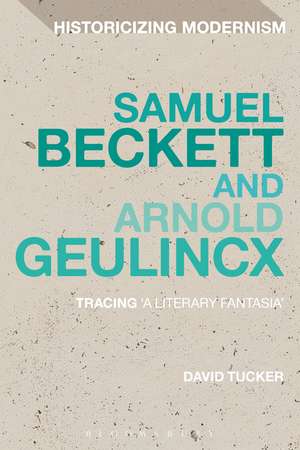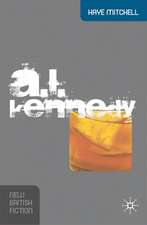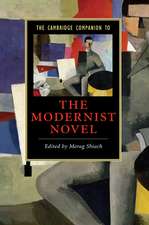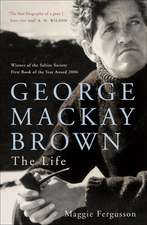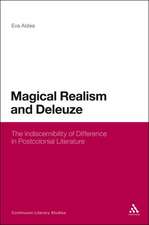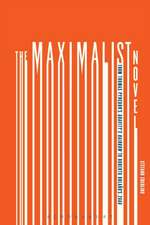Samuel Beckett and Arnold Geulincx: Tracing 'a literary fantasia': Historicizing Modernism
Autor Dr David Tuckeren Limba Engleză Paperback – 15 ian 2014
| Toate formatele și edițiile | Preț | Express |
|---|---|---|
| Paperback (1) | 257.12 lei 6-8 săpt. | |
| Bloomsbury Publishing – 15 ian 2014 | 257.12 lei 6-8 săpt. | |
| Hardback (1) | 772.58 lei 6-8 săpt. | |
| Bloomsbury Publishing – 2 mai 2012 | 772.58 lei 6-8 săpt. |
Din seria Historicizing Modernism
- 30%
 Preț: 600.06 lei
Preț: 600.06 lei -
 Preț: 447.39 lei
Preț: 447.39 lei - 30%
 Preț: 715.42 lei
Preț: 715.42 lei - 30%
 Preț: 602.11 lei
Preț: 602.11 lei - 30%
 Preț: 509.93 lei
Preț: 509.93 lei - 13%
 Preț: 237.84 lei
Preț: 237.84 lei - 22%
 Preț: 259.07 lei
Preț: 259.07 lei - 13%
 Preț: 255.76 lei
Preț: 255.76 lei - 22%
 Preț: 777.06 lei
Preț: 777.06 lei - 22%
 Preț: 257.68 lei
Preț: 257.68 lei - 22%
 Preț: 232.34 lei
Preț: 232.34 lei - 22%
 Preț: 257.32 lei
Preț: 257.32 lei - 13%
 Preț: 228.85 lei
Preț: 228.85 lei - 13%
 Preț: 257.97 lei
Preț: 257.97 lei - 13%
 Preț: 256.12 lei
Preț: 256.12 lei - 22%
 Preț: 258.59 lei
Preț: 258.59 lei - 13%
 Preț: 256.29 lei
Preț: 256.29 lei - 30%
 Preț: 716.56 lei
Preț: 716.56 lei - 13%
 Preț: 258.42 lei
Preț: 258.42 lei - 30%
 Preț: 657.22 lei
Preț: 657.22 lei -
 Preț: 259.07 lei
Preț: 259.07 lei - 13%
 Preț: 258.42 lei
Preț: 258.42 lei - 22%
 Preț: 258.42 lei
Preț: 258.42 lei - 13%
 Preț: 257.03 lei
Preț: 257.03 lei - 30%
 Preț: 717.05 lei
Preț: 717.05 lei - 13%
 Preț: 256.20 lei
Preț: 256.20 lei - 22%
 Preț: 259.25 lei
Preț: 259.25 lei - 30%
 Preț: 773.81 lei
Preț: 773.81 lei -
 Preț: 237.75 lei
Preț: 237.75 lei - 23%
 Preț: 236.27 lei
Preț: 236.27 lei
Preț: 257.12 lei
Preț vechi: 295.21 lei
-13% Nou
Puncte Express: 386
Preț estimativ în valută:
49.21€ • 50.94$ • 41.59£
49.21€ • 50.94$ • 41.59£
Carte tipărită la comandă
Livrare economică 05-19 martie
Preluare comenzi: 021 569.72.76
Specificații
ISBN-13: 9781472524072
ISBN-10: 1472524071
Pagini: 240
Ilustrații: black & white illustrations
Dimensiuni: 156 x 234 x 13 mm
Greutate: 0.35 kg
Ediția:NIPPOD.
Editura: Bloomsbury Publishing
Colecția Bloomsbury Academic
Seria Historicizing Modernism
Locul publicării:London, United Kingdom
ISBN-10: 1472524071
Pagini: 240
Ilustrații: black & white illustrations
Dimensiuni: 156 x 234 x 13 mm
Greutate: 0.35 kg
Ediția:NIPPOD.
Editura: Bloomsbury Publishing
Colecția Bloomsbury Academic
Seria Historicizing Modernism
Locul publicării:London, United Kingdom
Caracteristici
Brings a wealth of previously unpublishedmaterial from archives into the public domain.
Notă biografică
DavidTucker is a Visiting Research Fellow at the University of Sussexand currently teaches at the University of Oxford, UK. He is the editorof British Social Realism in the Arts since 1940 (Palgrave, 2011).
Cuprins
Series Editors' Preface A Chronology of Samuel Beckett & Arnold Geulincx Introduction 1. Beckett & Geulincx 2. Murphy: 'mechanical writing' 3. Watt: Ineffable Forces 4. Suite / La Fin / The End: Continuations and Conclusions 5. The Trilogy: Imagery and Axioms 6. Late Works Conclusion BibliographyIndex
Recenzii
'Every now and again, rarely, a book comes along that offers a definitive account of a particularly vexing critical question - this study is one of them. Drawing on a range of published and unpublished materials, David Tucker offers a comprehensive and sensitive examination of the role Geulincx plays in Beckett's writing and aesthetics, and in doing so makes us think differently about Beckett's work.'
Samuel Beckett's debt to Arnold Geulincx has been recognized on occasion, as it were, but this is the first detailed treatment of its lasting impact. David Tucker traces Beckett's early readings of the Belgian post-Cartesian philosopher from their manifest presence in Murphy (1938), through their more subtle intimations in the great writings of the 1940s, to their faint stirrings in the later prose, showing that Geulincx's Ethica and their central axiom, ubi nihil vales, ibi nihil velis, continued to define for Beckett a viable ethical principle in a worthless world.
This book charts comprehensively the deep influence of Arnold Geulincx on Beckett. Underpinning lucid textual readings with detailed archival evidence, Tucker's impressive study offers new understandings of the significance of Beckett's career-long engagement with this seventeenth-century ultrarationalist thinker. It is of relevance not only to scholars of Beckett, but also to those interested in the intersections of philosophy and literature within modern European culture.
One of the merit's of Tucker's study is that it bolsters a careful consideration of the historical and the archival evidence with a close attention to the texture of Beckett's texts. Just as important, it attempts an evenhanded appraisal of previous readers' under- and over-estimation of Geulincx's significance for Beckett...The most well-researched account of Beckett and Geulincx that we are likely to get...Tucker's study succeeds admirably in this regard, and in doing so performs a long-overdue service to Beckett studies. Accordingly, this book will also serve as a key reference point for the fast-growing body of scholarship on Beckett and philosophy more broadly.
Samuel Beckett's debt to Arnold Geulincx has been recognized on occasion, as it were, but this is the first detailed treatment of its lasting impact. David Tucker traces Beckett's early readings of the Belgian post-Cartesian philosopher from their manifest presence in Murphy (1938), through their more subtle intimations in the great writings of the 1940s, to their faint stirrings in the later prose, showing that Geulincx's Ethica and their central axiom, ubi nihil vales, ibi nihil velis, continued to define for Beckett a viable ethical principle in a worthless world.
This book charts comprehensively the deep influence of Arnold Geulincx on Beckett. Underpinning lucid textual readings with detailed archival evidence, Tucker's impressive study offers new understandings of the significance of Beckett's career-long engagement with this seventeenth-century ultrarationalist thinker. It is of relevance not only to scholars of Beckett, but also to those interested in the intersections of philosophy and literature within modern European culture.
One of the merit's of Tucker's study is that it bolsters a careful consideration of the historical and the archival evidence with a close attention to the texture of Beckett's texts. Just as important, it attempts an evenhanded appraisal of previous readers' under- and over-estimation of Geulincx's significance for Beckett...The most well-researched account of Beckett and Geulincx that we are likely to get...Tucker's study succeeds admirably in this regard, and in doing so performs a long-overdue service to Beckett studies. Accordingly, this book will also serve as a key reference point for the fast-growing body of scholarship on Beckett and philosophy more broadly.
